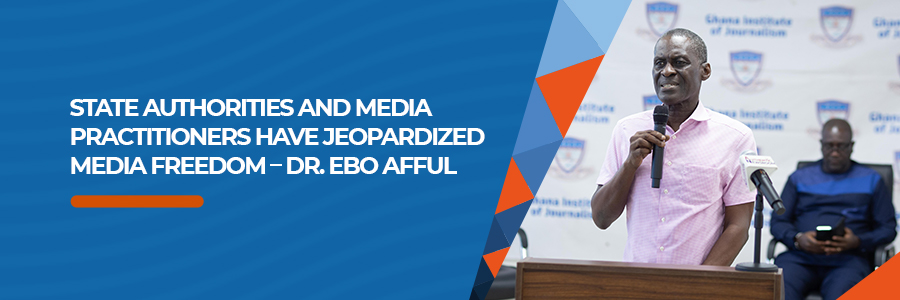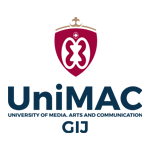
Dr. Ebo Afful, the head of the Communication Studies Department at GIJ, has stated the two most important pillars of press freedom, media practitioners and state authorities, have jeopardized media freedom in in Ghana. He said during a public forum organized by the Institute’s Directorate of Research, Innovation and Development on March 17, 2022, at the Dzorwulu Campus on the theme “Re-examining freedom of expression, ethics, and threats to the safety of journalists”. He stated that “Our media practitioners have been reckless by throwing to the dogs the ethics of the profession. They fabricate stories, refuse to verify information, and tell outright lies”. He cited a 2020/2021 report of the Media Foundation for West Africa (MFWA) which captured 1,754 cases of ethical violations by ten radio stations”.
Dr. Afful, highlighting ways in which state actors have jeopardized press freedom said, “When they believe media practitioners have crossed the line, instead of going to the National Media Commission to seek redress, or resort to rejoinders or even going to the court, they prefer to encourage state security agencies to pick up the alleged offenders, molest, harass and intimidate them.”
He called on all actors in the media space as well as state agencies to join hands to ensure that press freedom, a major prerequisite for democratic governance, is protected. He suggested that the power to issue broadcasting licenses be transferred from the National Communications Authority, a part of the executive arm of government, to the National Media Commission.
Mr. George Sarpong, the Executive Secretary of the National Media Commission, on his part stated that, recent events that have sparked claims that freedom of expression is under attack must be looked at critically as they cannot be lumped together in the context of limitation of freedom of expression. “To be able to say something constitutes a limitation on their freedom, first of all you must be able to show that there is a law on that matter and that the law is reasonably required in the context of these five elements: National Security, Public order, Public morality, Protection of the reputations of others and the rights of other people”.
“So anytime you want to make analysis over whether somebody’s encounter with the police constitutes an infringement on that person’s right to free expression, the first thing you want to do is to come to this provision and to check the matter that you are dealing with against these rules”.
The third panelist, Nana Kweku Kumi, a legal officer for the Commission of Human Rights and Administrative Justice, threw more lights on the various rights citizens are entitled to and mentioned that when the rights of citizens are duly respected, press freedom will not be endangered.
The Chairman of the event, Prof. Eric Opoku Mensah, Deputy Rector of the Institute in his welcome address mentioned that Ghana’s constitutional democracy is anchored on several key principles, one of them being free speech and expression. He said recent events could question whether the country was not quietly re-operationalizing a law such as the Repeal of the Criminal Libel and Seditious Law Amendment Act, Act 602 with the arrest of journalists and citizens in alleged violation of free speech.
The forum brought students, journalists, media practitioners, civil society, and the academia together to have a very communal and participatory forum to discuss issues surrounding press freedom and ethical journalism.
